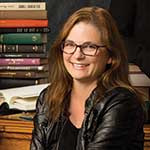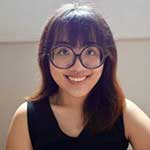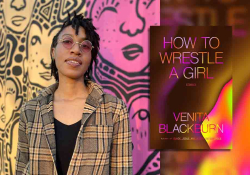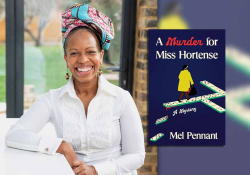10 Questions for Hwang Bo-reum
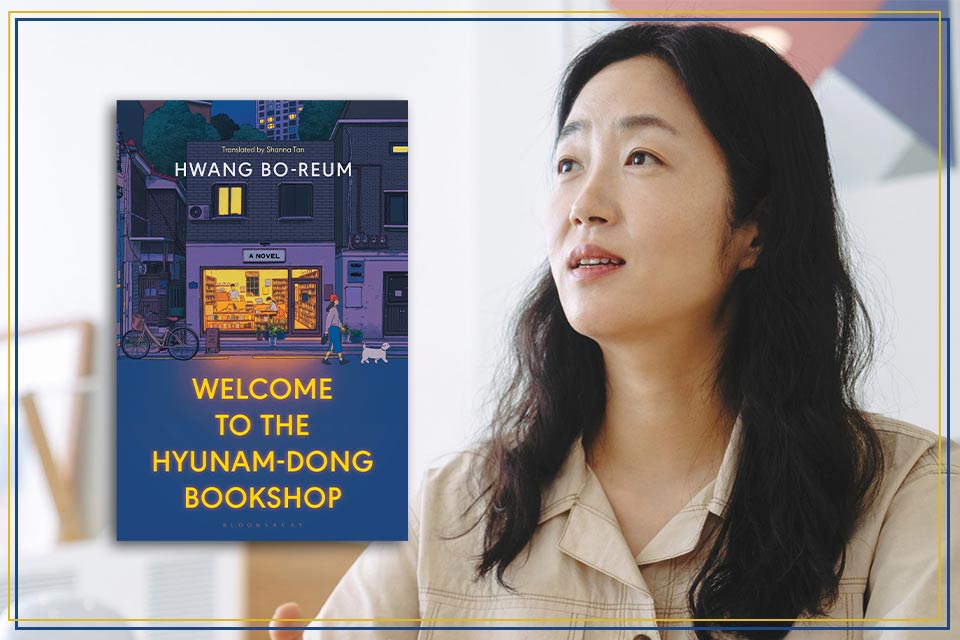
Hwang Bo-reum’s debut novel, Welcome to the Hyunam-dong Bookshop, translated by Shanna Tan, was published on February 20 by Bloomsbury. In this independent bookshop in a residential neighborhood in Seoul, several characters find connection and work through life’s big questions.
Q: Reading this book creates some of the comfort I feel upon entering a bookshop, which is where I like to shop for books. What do brick-and-mortar bookshops offer over online shopping?
A: When we shop for books online, we’re mainly using our fingers and eyes. But in a brick-and-mortar shop, we use something else too—our legs. We walk to browse the shelves, and that’s what I love about physical book shopping. For those who’ve spent time weaving among the bookshelves, poring over the titles, you’ll know what I mean. It’s a lovely thing to do, and when we see a book that catches our eyes, it’s nice to be able to read the foreword, the synopsis, or sometimes we may just want to flip to a random page. Sure, some online bookshops offer an e-sample too, but in a brick-and-mortar bookshop, you can browse beyond the limits of the sample, and that’s what I love about book shopping in person.
In a brick-and-mortar bookshop, you can browse beyond the limits of the sample.
Q: The protagonist of the novel, Yeongju, opens a bookshop, which is a major life change for her. In this new phase of her life, one question she asks herself is what makes a good bookshop. How would you answer this question?
A: It’s the curation. I love it when thought and care have gone into deciding what to stock, and it gives me a sense of what the bookshop owner enjoys.
Q: What are some of your favorite bookshops?
A: Back when I was living in Seoul, I often visited the bookshop in my neighborhood and attended their book club meetings. Three years ago, I moved to Gyeonggi-do. My new neighborhood doesn’t have its own indie bookshop, although I’ll occasionally drop by one that’s along the route that I take walks on. I love all the bookshops that I visited in different parts of Korea during my book tours. One indie bookshop owner in Daejeon told me they’d love it if I could come to give talks whenever I’m free, and that really warmed my heart and makes me like their bookshop even more.
Q: Yeongju seems to be reading as a form of recovery. Do you see reading as a means of recovery?
A: Yes, I do. Although, sometimes, it’s easier to recover by not doing anything. These days, instead of reading for a specific reason, I simply read every day. But that doesn’t mean I don’t choose. Depending on how I feel or what I’m preoccupied with at that point in time, I’ll be attracted to different types of books.
Q: There’s a reference to a French novel I really enjoyed, Muriel Barbery’s The Elegance of the Hedgehog. Another French novel, though, came to mind when I read your novel: A Novel Bookstore, by Laurence Cossé. Though it’s a mystery, it concerns a bookshop and the excellent conversations people have there. I loved it. Have you read it? Are there other bookshop-focused novels you would recommend?
A: The Korean translation of Laurence Cossé’s novel retains its French title, Au bon roman. I liked it very much. In the novel, the bookshop offers its clientele a selection of literary masterpieces chosen by like-minded connoisseurs. When I was reading it, I thought to myself, I’d love to get my hands on the list!
I also enjoyed Gabrielle Zevin’s The Storied Life of A. J. Fikry. I always remind myself not to be fastidious, but I enjoyed how cranky the protagonist of the story is. Cranky, but warm at the same time.
Q: As a bookseller, Yeongju makes recommendations, and she finds herself thinking about the importance of timing, how like all else, reading is about timing. Is there a book that came to you right when you needed it?
A: If I had read Walden, by Henry David Thoreau, in my teens, I probably wouldn’t have appreciated it much. I picked up the book when I was in my twenties, a time when I was wondering what I wanted to do in life. Thus, it felt as though the book helped me answer the “how,” and that gave me strength. Even though I won’t be building a wooden cabin in the woods, I connected with his writing.
It felt as though Walden helped me answer the “how,” and that gave me strength.
Q: Minjun, the bookshop’s barista, watches a lot of movies. From viewing many films, he eventually realizes something they all have in common: the characters are always at a crossroads. Can you think of a time when you were at a crossroads? What did you do?
A: I was in a slump and couldn’t write for a year. An author approached me back then asking if I’d like to do something together—to write something every week and send it in an email newsletter to readers. I can’t do this, I thought. At that point, I struggled with even a short social media post. I couldn’t even write something short without erasing it multiple times; how could I write an entire essay? I deliberated over it, but eventually I said okay. After doing that for nine weeks (it wasn’t easy), I think it helped me get out of my slump.
Q: Yeongju hosts authors in the bookshop and conducts Q&As. She asks the author Seungwoo how similar he is to his writing. How similar are you to your writing?
A: I’ll repeat his answer: Is there someone who’d know for sure?
My writing contains something of me, so there’ll be similarities. But because I don’t put everything of myself into my writing, it’s not going to be 100 percent the same. I think I’ll say 70 percent. Not that it’s exactly 70 percent, but at least for essays, I feel like it’ll have to be at least 70 percent similar to myself for readers to connect to and trust my writing. But there’s always a part of me that I’ll not show in public.
Q: There’s a lot of coffee in this novel, which is a good thing. What’s the coffee culture like in South Korea? Where is your favorite place to get coffee?
A: There are cafés everywhere, so yes, Koreans love to drink coffee. I don’t think I know anyone around me who doesn’t take coffee at all. We have not just the big franchise chains but also many small, independent coffee shops.
I like to stay home, so I usually don’t buy coffee outside. Neither do I have a go-to place. Instead, I alternate between my two coffee machines at home. Sadly, I’ve become more sensitive to caffeine in the past year. Even if I drink it in the morning, I can’t sleep at night. That’s why I’ve switched to decaf coffee.
Q: Which authors are you most excited about reading at the moment?
A: It’s hard to say who I’m “most” excited about. But to name a few authors who had their work translated into Korean in the past few months, I’d say Gabrielle Zevin and Sally Rooney.
Translation from the Korean
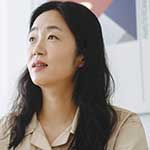
Hwang Bo-reum is the author of the essay collections I Read Every Day, I Tried Kickboxing for the First Time, and This Distance Is Perfect. Welcome to the Hyunam-dong Bookshop is her first novel and was initially published after winning an open contest co-organized by the Korean content-publishing platform Brunch. She lives in Seoul.
